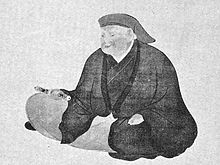Hon'ami Koetsu
| Hon'ami Kōetsu 本阿弥 光悦 |
|
|---|---|
 |
|
| Born | 1558 Kyoto, Japan |
| Died |
27 February 1637 Kyoto, Japan |
| Nationality | Japanese |
| Known for | |
| Notable work |
|
| Movement | Rinpa school |
Hon'ami Kōetsu (Japanese: 本阿弥 光悦; 1558 – 27 February 1637) was a Japanese craftsman, potter, lacquerer, and calligrapher, whose work is generally considered to have inspired the founding of the Rinpa school of painting.
Hon'ami was born into a family of sword polishers and connoisseurs who had served the Imperial court as well as the likes of Tokugawa Ieyasu and Oda Nobunaga, major warlords of the Sengoku period (1467–1603). His grandfather was counted as one of the "companions and advisors" (同朋衆, dōbōshū) of Shogun Ashikaga Yoshimasa. Kōetsu's father, Hon'ami Kōji (d. 1603), received a regular stipend from the Maeda family, in payment for his services as a sword connoisseur. Kōetsu would continue this relationship of his family with that of the Maeda, and with their domain in Kaga Province; he would advise the Maeda on swords, paintings, and other art objects. Kōetsu would meet many members of the art community through his connections with the Maeda, including tea master Kobori Enshū.
Kōetsu would also develop a close relationship with the Nō theater, and with the Kanze family of actors who lived near the Hon'ami family compound in northern Kyoto. He may have performed in Nō productions as a chanter, and designed a number of works for use by the actors or the theater.
Although trained as a swordpolisher (not a "swordsmith" in the standard Western sense; in Japan the tasks of forging and finishing a blade are performed by different craftsmen), Hon'ami became accomplished in pottery, lacquer, and ceramics as a result of his interest in Japanese tea ceremony, which had been revived and refined only a few decades earlier by Sen no Rikyu. In this art, he is regarded as one of the top pupils of the tea master Furuta Oribe and of the style known as Raku ware. Koetsu was given clay by Donyu II, the grandson of the first Raku potter, Chojiro I. Even though Kōetsu form was inspired by the Raku family tradition, he was such a great artist he added his own character to his tea bowls. One of these (called "Fuji-san') is designated a National Treasure. In all of Kōetsu's surviving correspondence, only one letter in fact concerns swords. He is believed to have passed on his professional obligations in this matter to his adopted son Kōsa and grandson Kōho.
...
Wikipedia
